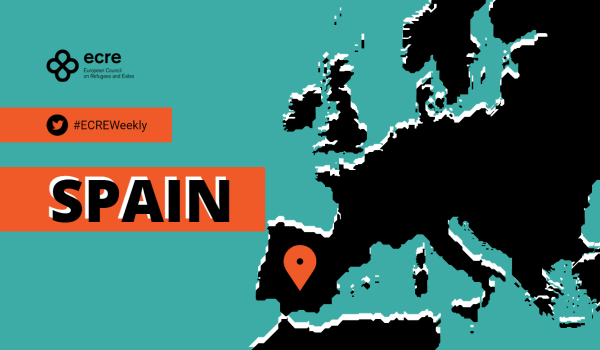NGOs and UN experts have called for investigations and accountability following new evidence revealed by BBC on the deadly tragedy at the Melilla border crossing separating Spain and Morocco. A delegation of Spanish MPs vising the area have been confronted with new evidence countering the government’s outline of events. Morocco continues crack-down and waves of arrests of migrants.
After a recent investigation by BBC uncovered details challenging the Spanish government’s outline of events during the deadly tragedy at the Melilla border crossing in June, calls for investigations and accountability continue. Experts appointed by the UN Human Rights Council, stated: “It is alarming there is still no concrete accountability months after dozens of migrants of African descent, including refugees and asylum seekers, died during violent encounters with border security forces in Melilla, Spain”. More than 100 NGOs have have called on MPs from the Interior Commission visiting Melilla on 7 November to conduct a parliamentary investigation into the tragedy that cost the lives of at least 37 people and left hundreds injured. The delegation of MPs from the Interior Commission representing parties from both government and opposition excluding only far-right Vox and Ciudadanos was presented with detailed new evidence of events. According to MP for the Catalan left-leaning party ERC, Maria Carvalho, the delegation was given a list of ammunition used by Guardia Civil including: “270 shots, 28 smoke projectiles, 86 tear gas projectiles, 65 rubber bullets and 41 sprays (pepper)”. Testimonies from survivors reveal that some deaths were caused by asphyxiated by tear gas or the result of being crushed in the panic of fleeing it. Jon Iñarritu, representing the Basque party HB, stated after watching CCTV footage shown to the delegation: “There is no doubt, the main events occurred in Spanish territory” and Enrique Santiago, from Unidas Podemos, the junior partner in the government coalition, said that “there was an apparent lack of attention to the most immediate relief needs of the victims”. Footage from Guardia Civil released to the delegation as well as to the Spanish Ombudsman verifies that young people were crushed and died on Spanish soil, that injured were left unattended and that at least 460 people were returned to Morocco without access to apply for asylum as is their right under international law – a procedure sometimes referred to as hot return or pushback. MPs have only seen part of the footage documenting events as parts of the material, including footage of a drone overflying the area is, according to Spanish authorities, the material is under judicial investigation. Reportedly, it has been seen by prosecutors and will be released in a closed-door session in the Parliament on an unspecified date.
Meanwhile, the Spanish government and local authorities continue deflecting and denying responsibility. The President of Melilla, Eduardo de Castro puts the blame on the gendarmerie of Morocco and defends the conduct of the Guardia Civil, saying (translated from Spanish) they were: “at a total disadvantage, the means they used were proportionate. That is the big difference between a civil guard and a gendarme who uses disproportionate means and does not have to give explanations as they have to be given in a state with rule of law”. Former Socialist minister, José Luis Ábalos, president of the Interior Commission has challenged events happening on Spanish soil, stating “No. It’s like airport transit zones”. “There was no death on Spanish territory,” Spain’s Interior Minister Fernando Grande-Marlaska told media following the BBC investigation, adding: “State security forces acted within the law, with proportionality and necessity”. According to sources from Interior (translated from Spanish): “None of those who were turned away at the border had serious injuries”, adding that rejection at the border and returns to Morocco is “perfectly legal”. Lucila Rodríguez-Alarcón, Director of the porCausa Foundation commented on 7 November in Público on the response from the government, stating (translated from Spanish): “What is incomprehensible is that the government, mainly the Ministry of Interior, really thought that it could hide information and manipulate the narrative of the facts as it has tried to do. Since the massacre took place, this Ministry has been chaining one lie with another, hiding evidence in the investigations, refusing to carry out a commission of inquiry. The attitude of Marlaska and his team have been so extremely exaggerated that one can only assume that they have something tremendous to hide or that their confidence in the impunity attributed to the Ministry of Interior by default makes it not worth striving to be transparent. Possibly it is both”.
Authorities in Morocco heavily funded by the EU and recently receiving increased funding from Spain for migration cooperation have continued its ongoing crack-down on migrants including the victims of the deadly tragedy in Melilla. Local media have reported of Moroccan security forces preventing an attempt by hundreds of migrants to cross the border into the Spanish enclave of Ceuta, arresting 300 people and causing injuries on both sides. According to Moroccan authorities, at least 14,746 attempts to cross border into Spain have been stopped in the first quarter of 2022.
For further information:
- ECRE, Atlantic Route and Spain: Investigation of Melilla Tragedy Puts Spanish Government “Under Fire” as EU Beefs Up Cooperation with Morocco, November 2022
- ECRE, EU Southern Borders: Spain and EU Funding for Morocco Amid Crack-down on Migrants, IOM Reports Thousands of Deaths on the Atlantic and Mediterranean as Tragedies Continue, Italy Funds the So-called Libyan Coastguard Amid Protests Over Migration Cooperation, October 2022
This article appeared in the ECRE Weekly Bulletin. You can subscribe to the Weekly Bulletin here.

